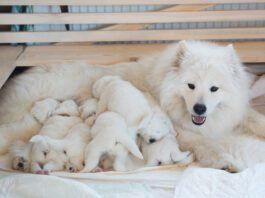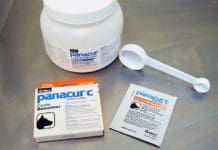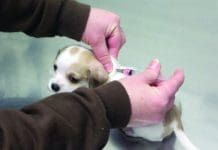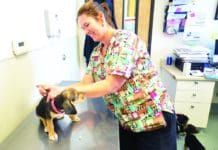What is the Best Puppy Shot Schedule?
A puppy’s shot schedule is usually based on advice from the American Animal Hospital Association, which breaks vaccines for dogs into two categories: core and non-core.
How Long Is a Dog Considered a Puppy?
The exact timeframe varies by size and breed, pretty much all dogs are considered adults by 2 years of age.
Umbilical Hernias in Puppies
If your puppy has an umbilical hernia it looks a lot like an “outie” puppy belly button. When the hole where the umbilical chord attached doesn't close properly it allows fat to poke out and create a bulge.
Panosteitis: Canine Growing Pains
Symptoms of panosteitis can look like other conditions, so a thorough evaluation is needed. Other diseases that can mimic panosteitis include tick-borne illnesses (Lyme disease, Rocky Mountain spotted fever), polyarthropathy (inflamed joints), sprains, and fractures.
9 Things To Do if Your Puppy Has Kennel Cough
Kennel cough, or tracheobronchitis, is comparable to the common cold in humans. Nevertheless, it is frightening to many new dog guardians to discover that their puppy or newly rescued dog has contracted the disease. An unrelenting goose-like cough is the hallmark of kennel cough in dogs, but fortunately, most cases are treated successfully at home. To ensure your puppy recovers from kennel cough in a minimal amount of time and without complication, Whole Dog Journal has outlined the necessary steps you, the concerned guardian, need to take.
Giardiasis and Coccidiosis in Puppies
Two of the most frustrating but common parasites your puppy might be hosting are Giardia and Coccidia. These are not worms, but two species of protozoa -- single-celled organisms that reproduce in the intestines of infected animals and shed their spores into the environment through the infected animals' feces. These spores can survive in watery environments and soil, long enough to be incidentally consumed by other animals, either by drinking contaminated water, eating contaminated grass, or just walking through (or sitting or lying on) contaminated soil and then grooming themselves.
Canine Parvovirus Vaccine, Symptoms, and Treatment
How is parvo spread among dogs? Whole Dog Journal discusses a number of canine parvovirus prevention and treatment approaches taken by veterinarians and dog guardians today. Reactions to parvovirus vary widely. In a world where parvovirus is literally everywhere, parvo kills some dogs and leaves others unscathed. And in the debate about parvo vaccination, some people vaccinate their dogs early and often, while others refuse to vaccinate against parvo at all.
Puppy Vaccines: Why Your Puppy Needs So Many Shots
Puppy vaccine schedules can be daunting to new dog owners. Why do puppies need so many shots? Are all those puppy vaccinations really necessary? Most veterinarians recommend that puppies are vaccinated for distemper, parvovirus, and adenovirus (hepatitis) a number of times, starting when they are about four to six weeks old, and again every three or four weeks, with their last puppy vaccination" given after they are about 16 to 20 weeks old. "
The Deal with Puppy Shots
You might be surprised to know that dogs don't actually need a series" of shots in order to be immunized against canine diseases. That said
Puppies in Public: Risk Factors
As the proud owner of a new puppy, you are faced with some big decisions in the first few months. Are ALL of those vaccinations necessary? Can my puppy start socializing by mingling at the dog park or on the street? When should I begin training, or hire a dog trainer? What may seem like obvious answers are actually quite complicated and critically important to your puppy's well being.
Putting Together the Puppy Puzzle
Contained in the October issue is an article I wrote about internal parasites worms. I needed art to accompany that article, and the best thing I could think of to depict a wormy dog was a photo of a typically round-bellied wormy puppy, the kind that is surrendered to shelters all too frequently. I called my local shelter and asked whether they had any wormy puppies with bloated tummies; it turned out that they had just received such a litter two days before, and I was invited to come down and take some pictures.
The First Week with a New Puppy
It's one of the best feelings in the whole world -- those first few hours with your new puppy when everything is perfect and anything is possible. It doesn't take long, however, for that bubble to burst. It could be the very first day, when you step in that pile of puppy poo on your Persian carpet, or find deep puppy tooth gouges in your treasured pair of Jimmy Choo shoes.



















